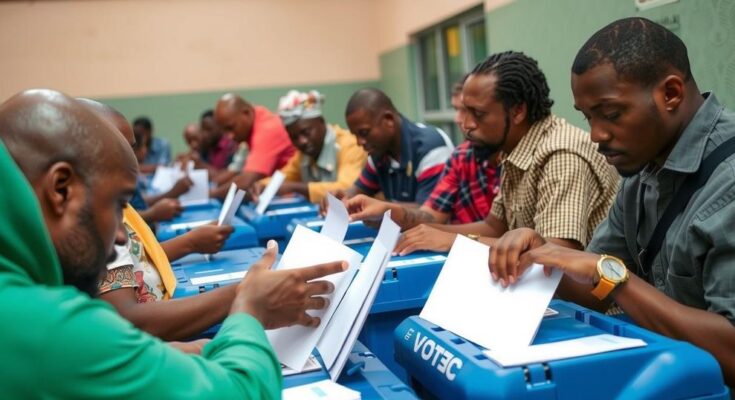Voting in Chad’s general elections has begun amid an opposition boycott, with President Mahamat Idriss Deby Itno presenting it as a democratic transition. Many citizens express skepticism about the elections, believing the ruling party will prevail irrespective of participation. The elections proceed amidst ongoing security threats and allegations of partisanship within the electoral management body.
Voting has commenced in Chad’s general elections, which President Mahamat Idriss Deby Itno has flagged as a vital move towards democratization. However, these elections are marred by a boycott led by opposition parties, which have dismissed the process as merely a facade aimed at entrenching the ruling party’s dominance. Notably, initial reports indicate that military personnel and nomadic tribespeople were called to vote on Saturday, while a broader segment of the population will participate on Sunday to elect members for the national parliament and local councils.
The atmosphere in Chad ahead of the elections has been described as one of indifference, with many citizens voicing skepticism regarding any potential change resulting from the polls. “They say they don’t expect to see any changes. They say that they believe that the ruling party is going to win no matter what,” noted Al Jazeera’s Catherine Soi, reflecting the prevailing sentiment among the populace. Instead, citizens are more inclined to discuss pressing issues such as the high cost of living, widespread corruption, and nepotism witnessed under the current administration.
The dominant opposition party, Transformers, has actively campaigned for a boycott of the elections, encouraging citizens to abstain from voting: “No campaign, no vote on December 29. Stay at home and ask others to do the same.” Despite calls for a boycott, it was reported that approximately 45 percent of soldiers and nomadic tribespeople had cast their votes by midday Saturday, suggesting a divide in public response to the electoral process.
These elections unfold against a backdrop of ongoing security threats, with Boko Haram’s recurrent attacks in the Lake Chad region adding to the turmoil. President Deby’s regime, which took power following the death of his father, Idriss Deby Itno, in 2021, seeks to frame these elections as transitioning Chad towards democracy. However, political analysts, such as Mamadou Bodian, express concern regarding the integrity of the electoral process, emphasizing that the electoral management body appears biased towards the ruling Patriotic Salvation Movement (MPS) party. “Even the electoral management body is seen as dominated by individuals loyal to the ruling party,” Bodian stated, signifying the skepticism surrounding these elections.
Chad has faced significant political unrest and challenges to its democratic processes. President Mahamat Idriss Deby Itno, following his ascension to power after the death of his father, has portrayed these elections as a pivotal moment in Chad’s transition toward democratic governance. However, the political landscape is marked by skepticism and opposition calls for boycotting, citing the elections as non-representative and manufactured to maintain the ruling party’s supremacy. This context is further complicated by regional insecurity due to insurgent groups and strained foreign relations, particularly with former colonial power France.
In conclusion, the elections in Chad are characterized by a contentious political climate, with opposition parties advocating for a boycott and public sentiments leaning towards indifference regarding the electoral outcomes. Despite the government’s assertions of democratic progress, the prevailing concerns over the fairness of the electoral process suggest that the legitimacy of these elections remains in question. As Chad navigates its political future, the outcomes of these elections will be critical in determining the nation’s commitment to genuine democracy.
Original Source: www.aljazeera.com




